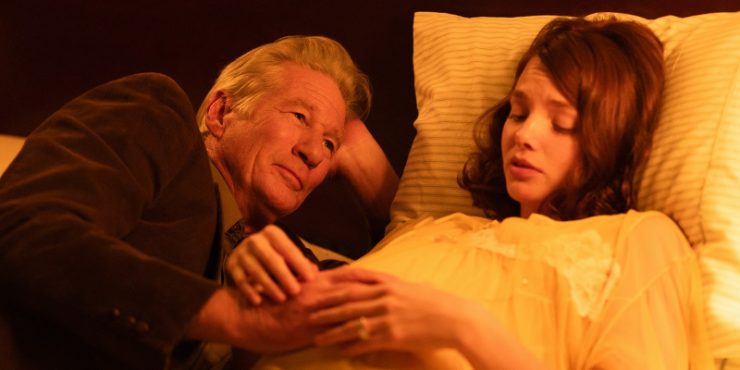If the last three films of Paul Schrader have been defined by his Travis Bickle-like protagonists – scribbling furiously in their notebooks while voiceover expresses their philosophical and existential crises – then Oh, Canada is him going Mishima mode. The writer/director has been haunted by the same spirits his entire career, and he has no qualms revisiting the same conundrums throughout his scripts. Schrader was never a filmmaker at the caliber of Martin Scorsese, his early collaborator. It makes sense that when Scorsese took Schrader’s scripts, he unlocked something beyond Schrader’s heavy self-loathing and middle American shame. That said, when he became a director in his own right, Schrader proved that not much more is needed to make enthralling drama.
Oh, Canada is an adaptation of the novel “Forgone” by Russell Banks. This is Schrader’s second adaptation of a Banks novel, after 1998’s Affliction, one of Schrader’s best films. Banks passed away last year, and the film is colored by a grief that’s obviously close at heart. It’s the story of Leo Fife (Richard Gere), a beloved documentary filmmaker who’s reaching the end of a terminal illness. He agrees to be interviewed by two former students (Michael Imperioli and Victoria Hill) for a film meant to explain the life of a great artist. Leo’s plan is a bit different: he sees the interview as a chance at confession, to shake loose the great torments of his life. Leo’s wife, Emma (Uma Thurman), watches on, worried what the project will do to her husband’s already failing health.
As the interview proceeds, Leo ignores the questions he’s asked and instead begins a monologue about his previous life before becoming a filmmaker. We flash back to him as a young man in the 1960’s (played by Jacob Elordi), with a young pregnant wife, living in Virginia. His in-laws have plans for him to run the family business, but his plan is to flee to Canada in a bid to avoid the draft. There’s another woman and another child even before that wife, all abandoned. Actually more like erased. As Leo began his life as a filmmaker and then a teacher, he recreated his life and rejected completely everything else that came before it. Close to death, Leo feels the need to tell Emma and his students the truth about his life. With a sterling reputation as a dogged nonfiction storyteller, he must confess that the foundations of his own biography are built upon fiction.
As Leo continues his story, timelines and characters get jumbled. It becomes obvious that in his old age and with his illness, his powers of recollection are not what they once were. Schrader makes the flashbacks intentionally hard to follow in a attempt to recreate Leo’s confused mind. Timelines and characters, and even what Leo is meant to be most ashamed of, get mixed around consistently. Even the narration jumps between first person and third person. This occasionally makes Oh, Canada a ponderous exercise, even if its execution can be occasionally captivating. Casting Gere in the role of Leo, pays surprising dividends. The star’s evergreen good looks are muted into sickly moroseness. Over forty years have passed since Gere’s last Schrader film, American Gigolo, where Gere was the picture of physical virility. Forcing us to watch Gere decay adds a layer of gravity to the film you wouldn’t expect.
It’s easy to look at Oh, Canada and think that Schrader is contemplating his own mortality. That he’s making his Irishman, if you will. There is a little bit of that here, but Schrader seems to be actively rejecting the dignity of old age, and giving an ardent middle finger for those who give reverence for reverence’s sake. Even if we can’t fully parse what is tormenting Leo in his final days, Schrader makes it clear that he has no interest in being re-written as a flawless artist after he can no longer speak for himself. In the third act, Schrader does finally reveal the scheme behind his befuddling structure, and another character arrives to prove that even at his most soul-revealing moments, Leo is still hiding uglier portions of his life. It’s a classic Schrader touch, putting his thumb on the scale of the protagonist’s unreliability, and further proof that he’s not as confused as Leo Fife quite yet.
Written for the Screen and Directed by Paul Schrader










